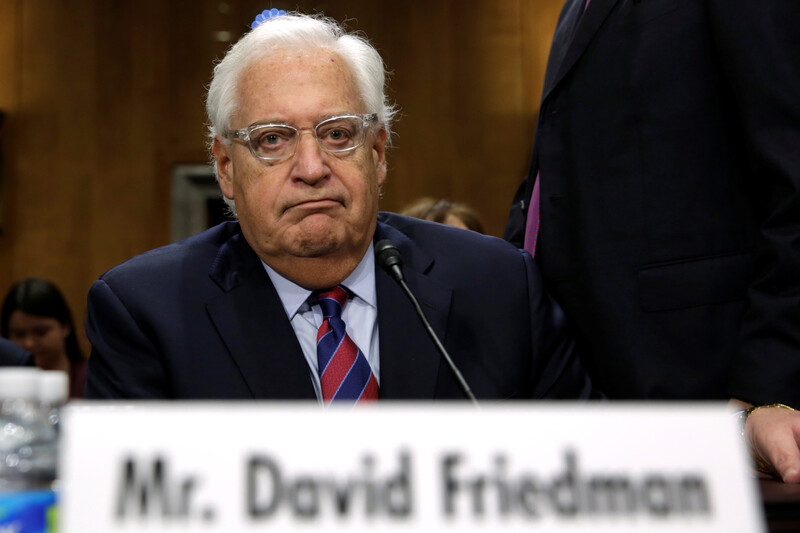Power Suits 17 February 2017

David Friedman, Donald Trump’s pick for US ambassador to Israel, has raised millions of dollars for Israeli settlements.
ReutersDavid Friedman faced a few sharp questions Thursday as a US Senate committee considered his nomination for the post of ambassador to Israel.
This was to be expected: Friedman had previously described supporters of the liberal Zionist group J Street as “far worse than kapos – Jews who turned in their fellow Jews in the Nazi death camps.”
Some senators were bound to ask him about such intemperate comments and it was not surprising that Friedman repeatedly expressed “regret” for his undiplomatic language. But it was equally predictable that senators would avoid pressing Friedman on aspects of his background curtailing Palestinian rights.
Friedman has a home in Talbiyeh, a West Jerusalem neighborhood that was ethnically cleansed by Zionist forces in 1948.
No senator asked Friedman whether he lives in a home owned by a Palestinian or in a residence constructed since the mass expulsion. No one asked him what should be done with the private property in his neighborhood to which uprooted Palestinians hold the deeds.
Long way to go
Friedman’s appearance before the Senate Committee on Foreign Relations demonstrated there is a very long way to go before Palestinian political and economic rights are properly addressed by US politicians.
Senators were widely reluctant to confront the reality of occupation. They did not want to engage the fact that Palestinians enjoy fewer rights than Israeli Jews and that there is a military occupation of the West Bank and Gaza.
No senator dared to describe Israel as an apartheid state. Only the protesters who briefly disrupted the proceedings drew attention to the forcing out of Palestinians at the time of Israel’s establishment.
The process initiated has less to do with whether all 11 Republicans on the committee will vote en masse for Friedman – a likelihood – and more to do with whether the emerging partisan split on Israel will continue to grow.Will Israel’s staunchest Democratic allies – the party’s Trump-Netanyahu wing – endorse Friedman?
Some of them might.
Bob Menendez is one, though the Democratic senator from New Jersey described Friedman’s appearance before the foreign relations committee as a “nomination conversion.”
Mike Merryman-Lotze, Palestine-Israel Program Director for the American Friends Service Committee, a Quaker organization, stated, “When you have spent years spreading virulently racist hate, saying that you reject your previous statements when confronted with them at a job interview does not absolve you of responsibility for your action nor demonstrate your genuine contrition.”
New extreme
Yet even if all Democrats on the committee vote against Friedman, their motives in doing so should be scrutinized. Why are they more concerned with how Friedman has insulted Barack Obama, Hillary Clinton, Chuck Schumer – now the Senate’s minority leader – and J Street than how he has aided Israel’s crimes?
For that is precisely what Friedman has done. Friedman heads the American Friends of Bet El Yeshiva Center. In that capacity, he has funneled millions of dollars into an Israeli settlement in the occupied West Bank.
Consequently, he has played a significant role in sustaining a colony built in violation of international law.
Friedman’s efforts to present himself as moderate this week should not fool anyone.
He claimed, for example, that he currently does not support annexation of the West Bank by Israel. Yet annexation is clearly the objective of the settler movement to which he belongs.
Implicitly, Friedman admitted that his attempts to sound reasonable were made to ensure that his nomination is approved. When Bob Corker, the committee’s chair, expressed astonishment that he was willing to “recant every strongly held belief that you’ve expressed, almost,” Friedman replied that serving as ambassador to Israel would be the “fulfillment of my life’s work.”
There were some notable contributions from Democrats at Friedman’s hearing.
Senator Jeanne Shaheen from New Hampshire was perhaps the most outspoken in raising concerns that carried the discussion beyond the offense Friedman caused J Street and its supporters. She sounded the alarm about Israel’s discriminatory treatment of visiting Arab Americans and secured Friedman’s agreement – for what it’s worth – to raise this matter with the Israeli government when it happens on his watch.
Senator Tim Kaine from Virginia managed to get Friedman on record agreeing that it would be untenable to force Palestinians to accept inferior rights in the context of a one-state solution.Kaine is no champion of Palestinian rights. Not long ago, he was the running mate of Hillary Clinton, who had pledged to have an even stronger relationship with Israel than Obama if she were elected president.
Overall, the Democrats’ displeasure with Friedman was encapsulated by Tom Udall, senator from New Mexico. Udall complained that Friedman regarded anyone who doesn’t agree with the ambassador-in-waiting’s “extreme views or approach to Israel” as an “anti-Semite.”
The posting of a settlement advocate as US ambassador to Israel would certainly mark a new extreme. But it would not be illogical.
For decades, the US political elite – Democrats and Republicans alike – have advanced Israel’s colonialist project by providing billions of dollars in military aid. This is simply another step toward the US government normalizing the illegal settlements it has watched grow over the last 50 years.
With President Trump indicating Wednesday that he does not care whether Israel and the Palestinians choose one state or two states, such settlements appear certain to grow and soon the US will have to choose between accepting Israeli apartheid or insisting on equal rights for all.




